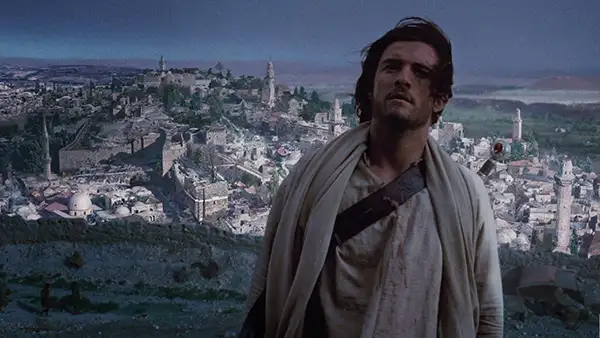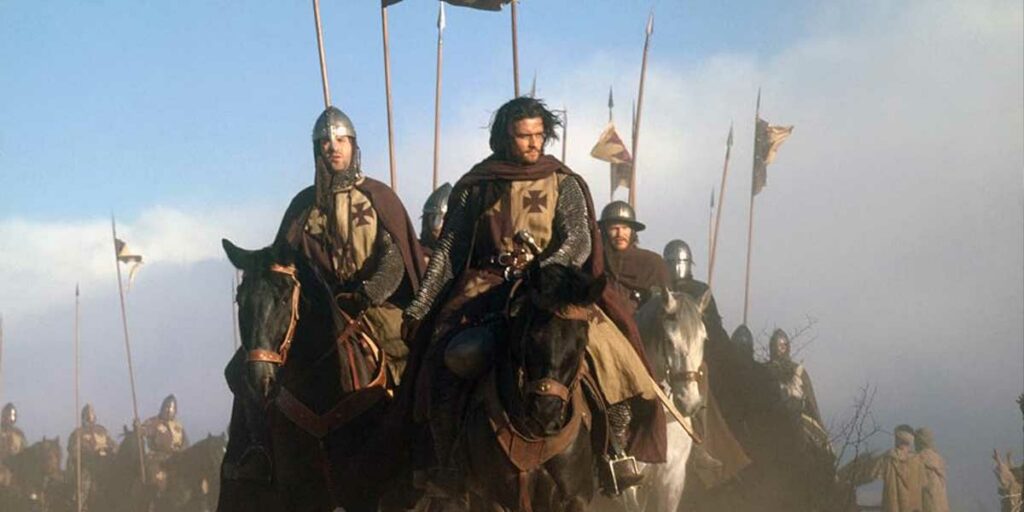Ridley Scott takes aim at those who pervert religion to their own whims in the director’s cut of Kingdom of Heaven, an underrated classic.
Many people considered director Ridley Scott’s decision to release his 2005 epic Kingdom of Heaven amid unrest in the Middle East as bold, if not insane. Due to its inherent controversy, the role of religion in the film, and the fact that the theatrical cut met negative reviews from critics, the film seems to have somewhat faded into history. Other than Scott completists or historical epic fanatics willing to offer an analysis of the picture, Kingdom of Heaven has exited the cinematic conversation.
However, the film’s director’s cut, which fleshes out plot points and key ideas, is not only a triumph, but it also features potent messaging about the current state of our world. It critiques and indicts those who use religion as an excuse to enact terrible deeds upon others. Kingdom of Heaven’s thesis, that mankind often commits horrible, inhumane, selfish atrocities in the name of religion, sadly remains a relevant topic of discussion today.
Set during the Crusades 100 years after Christian armies seized Jerusalem, Kingdom of Heaven follows Balian (Orlando Bloom), a Frenchman who begins a quest to the Holy Land of Jerusalem to absolve himself of his sins and the sins of his wife, who committed suicide. As he embarks on this quest, and spends much of the runtime in Jerusalem, Balian witnesses the hypocrisy of religious and military leadership on both sides of the Crusades. On the road to Jerusalem with his father Godfrey (Liam Neeson), Balian meets the radical Guy de Lusignan (Marton Csokas), a brutal, anti-Muslim Knights Templar who unleashes brutal attacks on the Muslim people throughout the film. When Balian arrives in Jerusalem, he meets Jerusalem’s king Baldwin IV (Edward Norton), and the Islamic leader Saladin (Ghassan Massroud), who honors a truce between the Muslims and Christians but eventually attempts a siege on the holy city.
Balian serves the function of a typical hero, acting as a moral compass in the face of evil. Balian’s light shines more brightly considering the corruption of the characters around him. Guy, Saladin, and the others in the conflict act in ways that are selfish or evil. Guy and his accomplice, Raynald (Brendan Gleeson) commit a massacre of Muslims, kill those who oppose their actions, and try to kill Balian when the see him as a threat to their power. Scott juxtaposes the actions of these powerful men with the actions of Balian, who Bloom portrays as generous, kind, and unwilling to fall into the traps of religious dogma.
An early example of Balian’s innate goodness is his compassion on a servant he spares in a fight. This “servant” is later revealed to be a chancellor for Saladin and spares Balian in battle. He also helps the townspeople build a well to provide fresh water. The use of lively music and beautiful cinematography in this scene paint Bloom’s actions as noble, while Scott films the actions of Guy, Raynald, and others with a certain dread. While Balian fights on the “Christian” side of the Crusades, Scott seems to suggest that it is Balian’s good deeds, not his religious views, that ultimately make him a moral person.

Kingdom of Heaven detractors have labeled the epic as “anti-Christian,” “anti-Muslim,” “too pro-Christian,” “too pro-Muslim,” and everything in between. One article in the Telegraph states the film “panders to Osama Bin Laden,” while other Christian-based sites have claimed the film contains “intentional blasphemy” (Movieguide). A better term to define the film, however, might be “anti-dogmatic.” Scott’s movie attacks religious authorities who pass down rules, regulations, and ideas that do not align with their belief systems in an attempt to gain power.
The film also expresses the dangers of religious extremism. The film’s two main antagonists, Guy de Lusignan and Raynald of Châtillon (Brendan Gleeson), use their hatred of different viewpoints besides their own fanaticism to oppress and kill others. Bishop, a character in the director’s cut, says early in the film while discussing some of the atrocities he’s seen from the Christians: “I ask myself, ‘would Jesus do it thusly?’ There is so much done in Christendom of which Christ would be incapable.” This line clearly presents a rift between those who truly follow Christianity and those who abuse it for the sake of power.
Scott’s personal religious views seem to range anywhere from “agnostic” to “atheist.” With that information, one could easily dismiss his critique of dogmatic religion as simply a doubter expressing his uneasiness about religion in general. But such an analysis would miss the nuance in Kingdom of Heaven. The film presents good and bad characters on each side of the conflict, suggesting that good and bad people can be found within the confines of any religious institution or affiliation. David Thewlis’ character, a hospitaler (one who devotes care to the sick), says he’s seen too much religion in the eyes of murderers, and that holiness, in his view, is in right action and courage. According to the film, only when people act in this manner will the true “kingdom of heaven” spread across the earth.
Looking within and outside the boundaries of the United States, it is easy to see why such religious topics are still relevant in 2023. It is hard not to compare the fanatics of Kingdom of Heaven to contemporary religious extremists, ones who hold up “Jesus Saves” signs while violently storming the United States Capitol. National tragedies such as this, as well as the continued conflict in the Middle East – much of which can be broken down into a religious conflict – prove that the message of this movie still needs to be seen and heard. Scott’s epic ends with a harrowing piece of on-screen text: “Peace in the kingdom of Heaven remains elusive.” Whether it be war in the Middle East or the corruption of religious values in the United States, this statement still rings true.
Kingdom of Heaven is now available to watch on digital and on demand.

